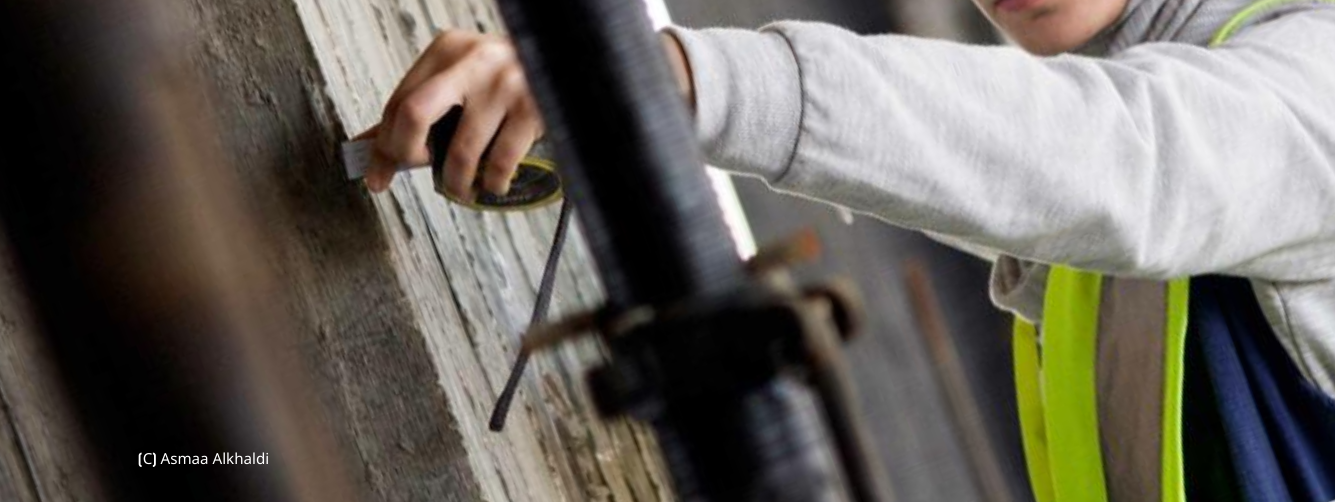
During the meeting, two documentary films were shown and discussed: “A woman defies the occupation in Hebron” and “If they had taken him”, both of which document violations women are faced with in the occupied Palestinian territories. The meeting was attended by the women in the film who live in flashpoint areas with Israeli settlers. PLC members, representatives from different ministries and representatives of UN agencies also attended in addition to members of the national coalition for resolution 1325 in Palestine.
The film “A woman defies the occupation in Hebron” was produced by the family development association and Yousef Shahin as part of the initiatives supported by MIFTAH through the aforementioned project. It illustrated the suffering of Mrs. Jamileh Shalaldeh, Um Abdel Rahman who lives on Shuhada Street, surrounded by settlers. The film documents her daily life and the constant harassment and humiliation by settlers and occupation soldiers who try to force her out of her house. “My resolve to stay is like a thorn in their sides,” Shalaldeh said. She continued: “They attack me and humiliate me everyday because I remain steadfast and refuse to leave. What the film portrays is only a small part of the terrifying life I live.”
Um Ayman is a mother of nine from the Nablus-area village of Bourin and lives on land directly across from the Hazarit settlement. The documentary film “If they had taken him” is a production of Shashat for women’s films from director Layali Kilani. She says: “If they uproot one tree, I will plant 10 more in their place. I will never tire, I will never leave my home which is my father-in-law’s legacy. If I leave, the occupation will take all my land and the land around me. My steadfastness has protected this land from being confiscated by the settlement.” With tears running down her face, Um Ayman told the story of her daily hardship in facing the settlers who do not stop wreaking havoc; they burn trees and throw firebombs at her house, terrorizing her and her children day after day. She says her husband died of a heart attack from grief and shock as he watched their home go up in flames one day.
The two stories are examples of typical Palestinian women, symbols of the struggle, resistance and resolve. She is like an olive tree, rooted in the land, which she defends with her heart and soul. While she puts herself and her family at risk every day, she is lacking in the support and components needed for resistance.
In this regard, MIFTAH wanted to shed light on this marginalized sector of Palestinian society which lives in Area C in order to engage the relevant parties and inform them about this sector’s living conditions, especially after Palestine’s UN status update to non-member statehood. MIFTAH did exactly this, providing thee parties with the necessary information with the hope that they will assume their responsibilities in providing the citizens there with whatever they need in order to remain steadfast. The focus is particularly on women who live at flashpoints with settlers and the army, to transform aid into programs and policies in an organized and systematic framework.
During the meeting, health ministry representative Mr. Tarif Ashour said the ministry would stand by these women’s sides, saying they would visit them in their homes and offer them medical assistance, especially for Um Abdel Rahman who suffers from asthma. He also indicated that they may send counselors to the women’s homes; Ashour also suggested that the education ministry make school visits to the families.
On his part, deputy minister for social affairs Mr. Mohammed Abu Hmeid pointed to the need for an official position and clear policy to confront settlements. He called for financial aid to support them, considering them cases of resistance and not just social cases. MIFTAH is currently following up with the responsible parties and with all those who showed willingness to help and commit to their pledges.
It should be mentioned that MIFTAH began working with the project “Protection and equality from a gender perspective” since 2007. One of the most significant achievements of UN resolution 1325 for the protection of women in areas of conflict has been the publication of a booklet on 1325 and Palestinian women and the formation of a coalition in various districts (Jericho, the Jordan Valley, Nablus and Hebron) to enact the resolution. A training guidebook was also published on the subject and media campaigns endorsed. targeting communities in different districts.






